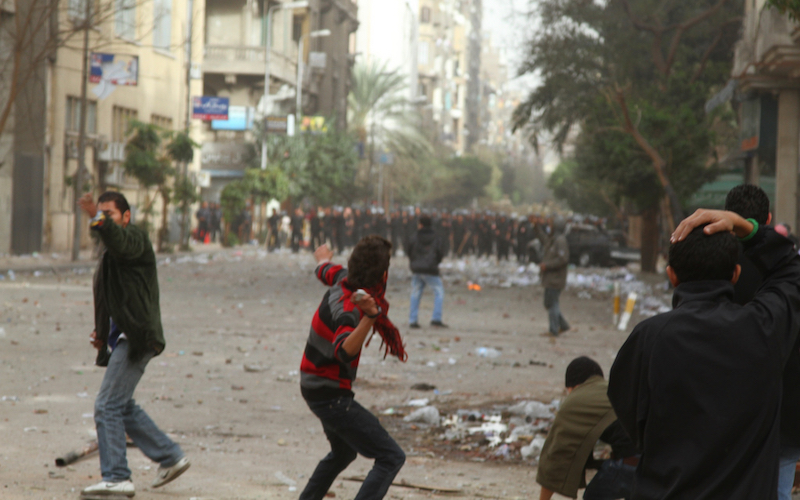
A New Egypt: When Silence Can Kill
Tahrir Square, the impassioned heart of Egypt’s three-year stand for democracy and a symbolic center of hope and optimism in Egypt, is now an open-air construction site. Today, the once epicenter of the ‘Arab Spring’ is a large underground parking lot in the making. Unfortunately, this reality presents no metaphor but rather a stark interpretation of Egypt, today.
A new, democratic Egypt was the goal, stepping out of President Hosni Mubarak’s shadow at last and realizing a united citizenry with common goals and equitable legislation. Unhampered by its quasi-parliament system — a government and system legitimized by mass protests — military President Abdel-Fattah al-Sisi has resumed authoritarian rule by imprisoning at least 16,000 people for their views — most for being members or supporters of the Muslim Brotherhood.
Even after the departure of Mubarak and turbulent ousting of Muslim Brotherhood President Mohamed Morsi, the Obama administration retained hope in Egypt as a rising democracy of the Middle East. Today, those hopes and that optimism seem naive and foolish. Where is Egypt heading and what has happened to the courageous people who epitomized Tahrir Square?
Since its June inception, the Sisi regime has been defined by obscene imprisonment sentences and an ignorance of fundamental human rights. In the same month, a Human Rights Watch report noted that the post-coup era saw the “worst incident[s] of mass unlawful killings in Egypt’s recent history.”
American hypocrisy soon followed when Secretary of State John Kerry renewed the US’s annual military aid to Egypt — about $1.5 billion — after quietly requesting a revaluation of protest laws.
In the past, US foreign policy has pragmatically favored tyranny in the Middle East to ensure an economically feasible national security plan abroad with bite. The sentiment and surrounding socio-political culture of this strategy works to quell the unrest of lower-tier class citizens in countries like Egypt — who overwhelmingly view the U.S. and Israel as the region’s greatest threats to peace.
Earlier this month, on October 13th in a brief update, Washington announced it would suspended an unreported portion of its $1.5 billion dollar aid package to Cairo. US Secretary of State John Kerry met for several hours with President Abdel Fattah al-Sisi to press the former military leader to adopt greater democratic reform measures. After the meeting, however, Kerry reassured reporters that US-Egypt ties remained strong as the “government undertakes significant reforms and works towards economic transformation for all Egyptians.”
In November 2013, under interim President Adly Mansour, a series of overarching draconian “protest laws” took hold. The new laws on public assembly restricts peaceful political demonstrations in violation of international standards. It effectively grants security officials discretion to ban any protest on very vague grounds, allowing police officers to forcibly disperse any protest if even a single protester throws a stone, and sets heavy prison sentences for vague offenses such as attempting to “influence the course of justice.”
According to Human Rights Watch, the statute includes no exceptions for smaller demonstrations that would not cause disruption, or for urgent and spontaneous demonstrations.
Law 107 of 2013, empowered by contemporary legislative powers under Egypt’s July 8th Constitutional Declaration, grants the Interior Ministry with the right to ban any meeting “of a public nature” of more than 10 people in a public place, including meetings related to electoral campaigning — on its own, it marks a new era in Egypt’s staggered judiciary.
In March, a Sisi aligned judge handed down 277 death sentences in two historic mass trials, again mostly to those accused of being Muslim Brotherhood members and supporters — the judge would later be removed from his court after international condemnation, though the trials remains unreversed. The regime has also imprisoned secular activists, such as Ahmed Maher, a founder of the April 6 youth movement, for an unauthorized protest, and journalists, including three Al Jazeera reporters who were falsely convicted in July on charges of aiding the Muslim Brotherhood.
Elizabeth Dickinson in Foreign Policy writes, “Qatar’s Arab Spring strategy began to fail in the same place it was conceived, amid the masses of protesters in Cairo’s Tahrir Square. On July 3, 2013, demonstrators cheered on the Egyptian military’s ouster of Islamist leader Mohamed Morsi, whose government Qatar had backed to the tune of $5 billion. Within days, Saudi Arabia, the UAE, and Kuwait welcomed the new military-backed government with combined pledges of $13 billion in aid.”
Much like the soon-to-be parking garage that is Tahrir Square, Mr. Sisi’s trajectory from head of military intelligence to president is a political mirage peddled by the regime and bought by its supporters. What started out as a crackdown on the Brotherhood has been extended, as it was bound to be, against secular dissenters — bloggers, academics, filmmakers, and human rights groups. Without question, Morsi was an inept president and The Brotherhood tried to monopolize power by right of its own agenda. But, it is nonetheless unjustifiable that the favor of a disappointed social movement formed today’s unholy alliance with an army that carries a history of oppression.
In order for Egypt to reach a stable political system it cannot rely on foreign direction or funding. Egypt will more than likely need another decade to produce strong political parties representing broad political forces. That being said, the international community has a role to play in reviewing the human rights situation in Egypt and in prompting further pressure to reform democratically.
The international community wants to see democratic progress. It wants to see economic development. It needs a strategic Middle East partner to address the conflicts in Syria, Iraq, and Palestine. But, Egypt must first reach a level of political and economic progress that provides the potential to produce a healthy environment for an efficient democratic process, one that frees citizens from what President Al-Sisi has called “difficult economic and social conditions.” Only then will a revolution take hold and be capable of forging lasting change in Egypt.

